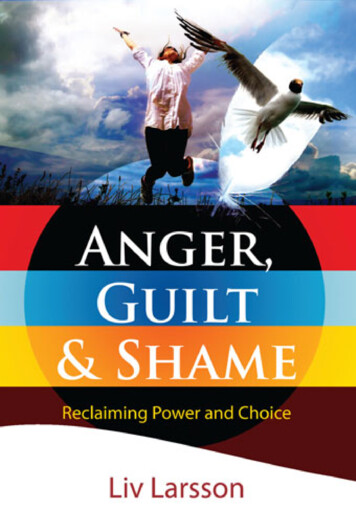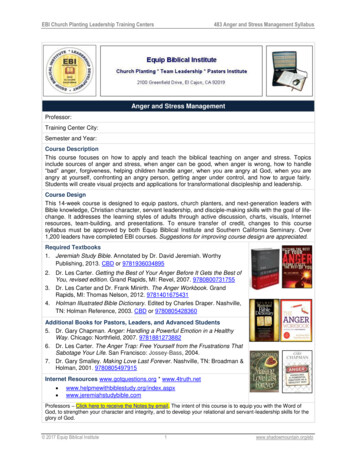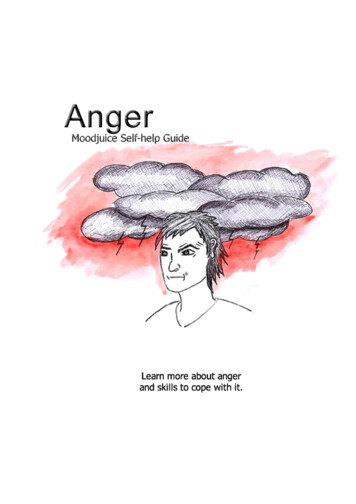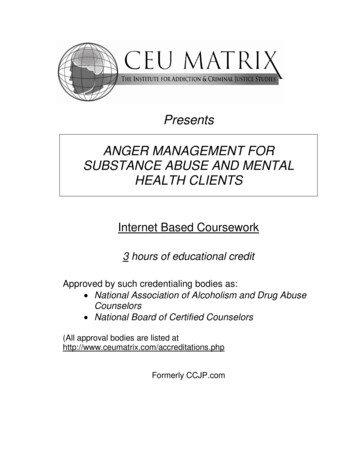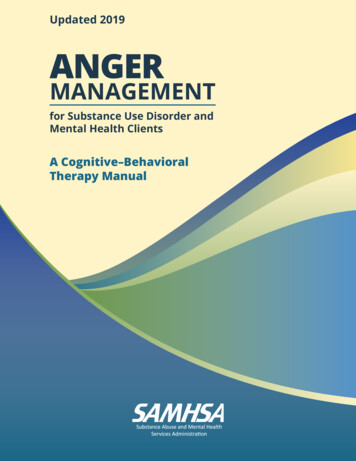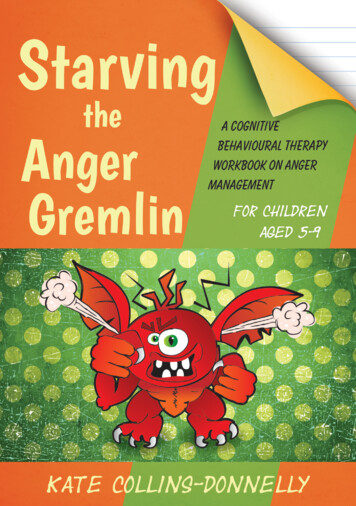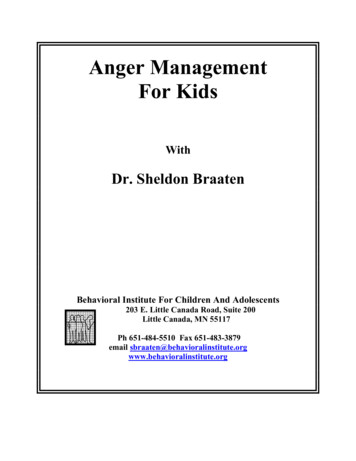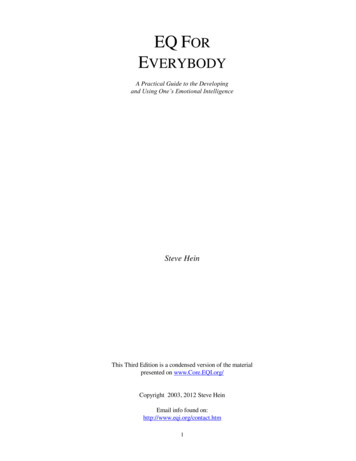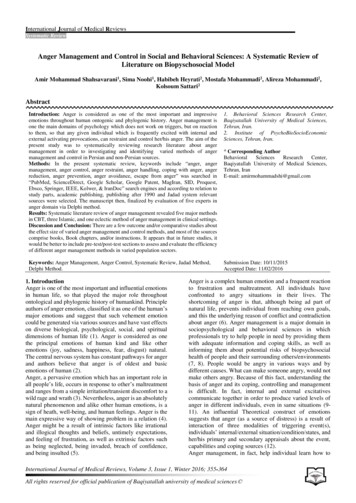
Transcription
International Journal of Medical ReviewsSystematic ReviewAnger Management and Control in Social and Behavioral Sciences: A Systematic Review ofLiterature on Biopyschosocial ModelAmir Mohammad Shahsavarani1, Sima Noohi1, Habibeh Heyrati2, Mostafa Mohammadi2, Alireza Mohammadi2,Kolsoum Sattari2AbstractIntroduction: Anger is considered as one of the most important and impressiveemotions throughout human ontogenic and phylogenic history. Anger management isone the main domains of psychology which does not work on triggers, but on reactionto them, so that any given individual which is frequently excited with internal andexternal activating provocations, can restraint and control her/his anger. The aim of thepresent study was to systematically reviewing research literature about angermanagement in order to investigating and identifying varied methods of angermanagement and control in Persian and non-Persian sources.Methods: In the present systematic review, keywords include “anger, angermanagement, anger control, anger restraint, anger handling, coping with anger, angerreduction, anger prevention, anger avoidance, escape from anger” was searched in“PubMed, ScienceDirect, Google Scholar, Google Patent, MagIran, SID, Proquest,Ebsco, Springer, IEEE, Kolwer, & IranDoc” search engines and according to relation tostudy parts, academic publishing, publishing after 1990 and Jadad system relevantsources were selected. The manuscript then, finalized by evaluation of five experts inanger domain via Delphi method.Results: Systematic literature review of anger management revealed five major methodsin CBT, three Islamic, and one eclectic method of anger management in clinical settings.Discussion and Conclusion: There are a few outcome and/or comparative studies aboutthe effect size of varied anger management and control methods, and most of the sourcescomprise books, Book chapters, and/or instructions. It appears that in future studies, itwould be better to include pre-test/post-test sections to assess and evaluate the efficiencyof different anger management methods in varied population sectors.1. Behavioral Sciences Research Center,Baqiyatallah University of Medical Sciences,Tehran, Iran.2. Institute of PsychoBioSocioEconomicSciences, Tehran, Iran.Keywords: Anger Management, Anger Control, Systematic Review, Jadad Method,Delphi Method.Submission Date: 10/11/2015Accepted Date: 11/02/20161. IntroductionAnger is one of the most important and influential emotionsin human life, so that played the major role throughoutontological and phylogenic history of humankind. Principleauthors of anger emotion, classified it as one of the human’smajor emotions and suggest that such vehement emotioncould be generated via various sources and have vast effectson diverse biological, psychological, social, and spiritualdimensions of human life (1). Anger is considered as onethe principal emotions of human kind and like otheremotions (joy, sadness, happiness, fear, disgust) natural.The central nervous system has constant pathways for angerand authors believe that anger is of oldest and basicemotions of human (2).Anger, a pervasive emotion which has an important role inall people’s life, occurs in response to other’s maltreatmentand ranges from a simple irritation/transient discomfort to awild rage and wrath (3). Nevertheless, anger is an absolutelynatural phenomenon and alike other human emotions, is asign of heath, well-being, and human feelings. Anger is themain expressive way of showing problem in a relation (4).Anger might be a result of intrinsic factors like irrationaland illogical thoughts and beliefs, untimely expectations,and feeling of frustration, as well as extrinsic factors suchas being neglected, being invaded, breach of confidence,and being insulted (5).* Corresponding h University of Medical Sciences,Tehran, IranE-mail: amirmohammadshi@gmail.comAnger is a complex human emotion and a frequent reactionto frustration and maltreatment. All individuals haveconfronted to angry situations in their lives. Theshortcoming of anger is that, although being ad part ofnatural life, prevents individual from reaching own goals,and this the underlying reason of conflict and contradictionabout anger (6). Anger management is a major domain insociopsychological and behavioral sciences in whichprofessionals try to help people in need by providing themwith adequate information and coping skills, as well asinforming them about potential risks of biopsychosocialhealth of people and their surrounding others/environments(7, 8). People would be angry in various ways and bydifferent causes. What can make someone angry, would notmake others angry. Because of this fact, understanding thebasis of anger and its coping, controlling and managementis difficult. In fact, internal and external excitativescommunicate together in order to produce varied levels ofanger in different individuals, even in same situations (911). An influential Theoretical construct of emotionssuggests that anger (as a source of distress) is a result ofinteraction of three modalities of triggering event(s),individuals’ internal/external situation/condition/states, andher/his primary and secondary appraisals about the event,capabilities and coping sources (12).Anger management, in fact, help individual learn how toInternational Journal of Medical Reviews, Volume 3, Issue 1, Winter 2016; 355-364All rights reserved for official publication of Baqiyatallah university of medical sciences
Shahsavarani AM, Anger Management and control in Social and Behavioral Sciencescalm down and inhibit and control negative feelings whichare prodromal to anger. Anger management does not meanto neglect anger at all (13, 14). Whenever someone intendto insult, violate values, defame, abuse, assault, andoppression, and try to propagate prostitution and sins, at firstthey shall be treated with assertion and decisiveness.However, if they continue disobeying and such actionswould be inconsequential, they deserve sacred wrath[Anfal/60].Holly Quran describes true believers as “ andthose who are with him [Muhammed] are strong againstUnbelievers, (but) compassionate amongst each other”[Fath/29].With respect to a significant increase in frequency of crimesin youth, widespread abuses in families, racial conflicts,increase of terroristic attacks, and entanglements ofordinary people in their routine interactions, anger isappeared to be the central in most problems of nowadayshuman life era. Nonetheless, hitherto anger disordersneither considered nor classified in any diagnosticclassification system of therapeutic plans (15). Theincrement of reference to “anger management” keyword inscientific databases reflects the importance of such issue.However, it is not clear which method of anger control andmanagement is the best, yet (16).The numerous methods of anger control and managementindicate the increasing importance of anger avoidance andchoosing rational and wise strategies which is distancingfrom basic emotional processing systems of brain oldstructures and considered as neocortical strategies ofmodern social life. Alas, still there is hardly a fewcomparative research on effect size, preference and priorityrate, as well as application of various anger managementmethods, especially in the form of review, systematicreview and meta-analysis. Therefore, the present systematicreview tries to sort and classify literature about angercontrol and management methods to from a requisitetheoretical base for such future studies.2. Method2.1. DesignThe present study was systematic review. Systematicreview is a type of literature review which focuses onresearch questions. In such type of study, authors try togather all worth-full research evidence related to theresearch question together, so that the result would be asynthesized combination of acknowledged, evaluated andselected evidence (17). Applicable steps of a givensystematic review would be formulating research questions,setting eligibility criteria, the use of conceptual models tocommunicate between research questions and eligibilitycriteria, gathering related evidence, screening of studies andliterature, the process of selection, and summarizing thefindings (18).2.2. Sample and procedureThe Population of the present study comprised publishedEnglish and Persian studies about anger between January,1, 2000 and June, 1, 2014. The keywords of the researchincluded anger, anger control, anger management, angerprevention, anger inhibition, anger coping, anger reduction,escape from anger, which were searched in scientific search356engines include PubMed, Science Direct, Google Scholar,MagIran, Google Patent, SID, Proquest, Kolwer, IEEE,Springer, Ebsco, and IranDoc, and most related papers wereselected. Inclusion criteria were date of publication(1/1/2000- 6/1/2014), subjective relevance, Academicsource of publication, and the relevance rate to keywordsaccording to search engines.Jadad scoring criterion was an additional issue forexperimental papers. Jadad scale which is also known asJadad scoring method, or Oxford quality scoring system, isan independent assessment process of methodologicalquality of research (19).2.3. AnalysisAfter data collection, with the use of Jadad method, the mostsuitable resources for the study were determined and put tothe dedicated part of the work. Results were collected,derived, and classified with use of librarian study design andanalyzed by content analysis as well as citation rates.Moreover, in order to improve the validity of the results andreducing biases in final analyses, Delphi method wasadministered. Delphi method helps to increase the level ofnovelty and creativity in the phase of exploration of newideas and mostly is addressed as a novel inspiring method.Using dialectical logic, Delphi method is to some extentalike grounded theory research design and tries to collect,classify, and manage the existing knowledge of experts (20,21). In the present study, to find the best methods of angermanagement and control, the question was sent to sixclinical psychologists (PhD of clinical psychologist withspecialized work legislation) which were specialized inanger management and research, and asked for providingthe well-known, most applicable, and most suitablemethods of anger control and management. Their initialanswers were summarized and unified and in the secondround sent back to all experts and asked to modify if thereis a need. The second round answers were integratedtogether and sent back to them for the third run. For the thirdtime, experts were modified the list. These modificationswere implemented in the synthetic form and was sent to theexperts for the fourth time. In this phase, all the expertsaccepted the list and therefore, this consensual list shapedthe final structure of the results structure of the study (Table1).2.4. EthicsThe most important ethical issue of the study, wasrespecting the copyrights of the authors of resources includepapers, books, book chapters, manuscripts, dissertations,etc., which is directly done in the present study. The otherissue was anonymity of the participants of Delphi method.The identity of all these experts kept anonymous. All theprocedure and aims of the study were fully described to allthem and they filled out written consent in which they fullyunderstand the terms of participation. The results of Delphimethod administration and the study were sent to theaforementioned experts as part of mutual partnership.3. FindingsIn order to study methods of anger control and management,281 research papers and 191 book/book chapters wereconsidered from which 74 papers and 29 book/bookInternational Journal of Medical Reviews, Volume 3, Issue 1, Winter 2016
Shahsavarani AM, Anger Management and control in Social and Behavioral Scienceschapters were chosen according to inclusion criteria of thestudy. After abstract review 34 full-text papers as well as 11book/book chapters were selected. Finally, 18 papers werechosen as the main body of inspection (diagram 1).In addition, with respect to the criteria of the systematicreview, 18 papers were considered as forming theconceptual framework of the study (table 2).According to the review of the literature related to anger, ithas been indicated that most of the efficient angermanagement techniques with sustainable outcomes, haveimplemented cognitive-behavioral methods, and othertherapeutic approaches at best had alike outcomes (22).Therefore, this part is devoted to cognitive-behavioral angermanagement approaches with high empirical support,citations, and reference. Moreover, because of theimportance of spiritual attitudes towards emotion regulationin social life, especially in Muslim societies, Islamic angermanagement approaches are presented next. AlthoughIslamic authors and researchers neither empirically tested,nor evaluated the comparative efficiency of Islamic angermanagement techniques, because they have been derivedfrom Quran teachings and biography of the Holly prophetMuhammad (s.a.a.w.a.w), Ahlulbayt (PBUH), and Islamicclergymen, there is a great value for practical use of them ineveryday life of Muslims. The final part is devoted to angercontrol and management in clinical and hospitalenvironments. In such environments, clinicians and health-care staff are inevitably confront with clients and patientswhich have low psychological and behavioral stability, andtherefore, obliged to implement different methods to controland manage anger so that safety of both health-care staff andtherapeutic environment could be provided, and there wouldbe no harm to violent and aggressive patients/clients.3.1. Cognitive-Behavioral approaches to angerThere are several cognitive-behavioral methods on angermanagement. The final consensus of Delphi methoddetermined five major methods which have been discussedas follows. A brief review of the following headlines ispresented in table 3.3.1.1. The model of American Psychological Associationon anger managementAmerican Psychological Association (APA) have provideda set of methods in a general package in order to angercontrol and management which include avoid explosiveexpression of feelings, using relaxation techniques,cognitive reconstruction, improvement of communicationskills, change the surrounding environment, sense of humor,choose the appropriate time to do provoking activities,avoid triggering factors of anger, find substitute/alternativeways to solve occurred problems, and use correct strategiesof problem solving. These are general strategies and APAhas suggested to seek for professional consultation and helpin frequent moderate to serious situations of losing temper(33).Table 1. Delphi method procedure to find the most suitable framework of the studyStages of theprocedureDesirable structure of the frame work of the studyFirst runAcademic method of anger management, psychological methods of anger management, Islamic methods of angermanagement, social methods of anger management, inpatient anger management, emergency ward anger management,hospital anger management, crisis anger management, crisis intervention, crime prevention, hostile behavior reduction,prison anger management, CBT anger management, behavioral anger management, military anger management, violencereduction, crowd rage control, sacred wrath, religious anger coping, spiritual methods of anger management, angermanagement in sports, cinema therapy, psychodrama, neuropsychotherapy of anger, method of Socrates, bibliotherapy,push-up button, executive control reinforcement.Second runPsychosocial anger management methods (American Psychological Association, crisis intervention, prison angermanagement, CBT anger management, Novaco’s anger management method, behavioral anger management,), religiousanger management methods (spiritual methods of anger management, Islamic methods of anger management), Hospitaland clinical anger management methods (hospital anger management, emergency ward anger management, inpatientanger management, outpatient clinical anger management).Third runCBT methods of anger management (American Psychological Association, Anger management based on cognitivereappraisal, Rational anger management, Williams and Williams’ method of anger management, Novaco’s angermanagement method), Islamic anger management methods (Four-steps Method of wrath restrain, Islamic techniques ofanger coping, Scientific and practical method of treatment of wrath), clinical anger management methods.Initial Search Results:281 papers191 book/bookchaptersExclusion of IrrelevantResources:74 papers29 book/book chaptersAbstract Review:34 full-texts11 book/book chaptersFinal Sample:18 papersDiagram 1. Sampling process of the studyInternational Journal of Medical Reviews, Volume 3, Issue 1, Winter 2016357
Shahsavarani AM, Anger Management and control in Social and Behavioral SciencesAuthorsBenavidez, etal. (7)Kumtonkun,et al. (9)Liang, et al.(10)Reidy, et al.(22)Goldstein, etal. (23)Williams, etal. (13)Piquero, et al.(14)Storch, et al.(24)Reidy, et al.(11)Siewert, et al.(16)Mike, et al.(25)Dhumad, etal. (26)Pieters, et al.(27)Naeem, et 12011201120102009Marangell,(29)2009McNiel, et al.(30)2008Glomb, (31)2005Novaco, et al.(32)2002Table 2. The papers which formed the conceptual frameworkType ofStudySampleJournalAnalysis methodstudygroupssizeAccident Analysis &correlation Analysissurvey4300Preventionof variancecorrelation AnalysisJournal of Retailingcorrelation3140of varianceEuropean Journal ofcorrelation Analysisexperimental237Pharmacologyof variancePersonality and Individualquasicorrelation Analysis235Differencesexperimentalof varianceCognitive and Behavioralquasi238analysis of variancePracticeexperimentalAggression and ViolentreviewBehaviorAggression and Violentcorrelation Analysisexperimental240Behaviorof varianceJournal of the AmericanAcademy of Child &survey1247correlationAdolescent PsychiatryAggression and ViolentreviewBehaviorPersonality and ressionAnnual Bulletin ofcorrelation AnalysisAcademic Managementcorrelation1269of varianceReviewcorrelation AnalysisPsychiatric Bulletinsurvey1407of variancecorrelation AnalysisPsychiatric Bulletinsurvey1283of varianceThe Cognitive Behaviourcorrelation Analysisexperimental224Therapistof variancecorrelation AnalysisBipolar Disorderslongitudinal11556of varianceRegression T-testcorrelation AnalysisAmerican Journal ofretrospective2169of variancePsychologyregressionJournal of Occupationalcorrelation Analysissurvey3481Health Psychologyof varianceJournal of Traumaticcorrelation Analysissurvey1530Stress,of variance3.1.2. Anger management model of Williams andWilliamsWilliams and Williams (34) have tried to represent themutual impacts of psychology and medicine in theirapproach to anger. In this approach, using the scientificevidence which relate anger and hostility to coronary heartdiseases (CHDs), authors have suggested practical andapproved strategies to reduce anger and improveinterpersonal relationships, These strategies comprise selfargumentation; try to stop angry thoughts, feelings, andstates; veering angry thoughts; daily meditation; avoidnervous provocation; verbal expression of feelings in thetime of anger; bread pets at home; active listening; try totrust others; take part in social and charity activities;cultivate the trait empathy; practice patience; cultivate thetrait forgiveness; find an insider (a confident one whichindividual can tell her/him secrets and in-depth problems);extend one’s sense of humor; frequent engagement s/spiritual activities and rituals; andmorethanatopsis (think that today is the last day of life).3.1.3. Anger management according to cognitivereappraisal (Klienke’s Method)Kleinke (35) have proposed an efficient method of angermanagement according to the interactional model of stress(cognitive-transactional-process approach) and copingconcept which have been proposed earlier (36). In Kleinke’smethod of anger management, individual shall reach to arelative awareness and acknowledgement about copingskills, cognitive appraisal system, and her/his anger, at first.Therefore, in the beginning, after explanation of cognitivetransactional-process approach and an introduction to angerphenomenon, following issues are inspected and clients areasked following questions and write down their answers:1. Who has caused the anger in the individual?2. What has caused the anger in the individual?3. Why people get angry?4. What are others’ reaction to anger?International Journal of Medical Reviews, Volume 3, Issue 1, Winter 2016
Shahsavarani AM, Anger Management and control in Social and Behavioral Sciences5. What is angry person’s reaction to her/his anger?Summarizing aforementioned questions, generally clarifyfor client that:1. Anger is a prevalent and frequent emotion that usuallybeen experienced when friends, family members, andsurroundings could not meet one’s expectations anddemands.2. Most of the time, the motive of anger is achievingexpectations and demands.3. Others’ reaction to one’s angry actions is oftennegative.4. Although, one can feel satisfied after angerexpression, angry and aggressive individual cannotreach her/his aims in the long run.In next step, before starting the anger management lessons,Individual would assess and evaluate her/his anger levelwith anger assessment instruments.Third step comprise learning 12 anger coping skills.These skills are firstly taught by therapist to clients andthen, they practice in group and as teamwork.Table 3. Cognitive-behavioral approaches to anger managementMethods of anger controland managementAmerican PsychologicalAssociationWilliams and Williams’method of anger managementAnger management based oncognitive reappraisal(Klienke)Novaco’s anger managementmethodRational anger managementHints1. avoid explosive expression of feelings2. using relaxation techniques3. cognitive reconstruction4. improvement of communication skills5. change the surrounding environment6. sense of humor7. choose the appropriate time to do provoking activities8. avoid triggering factors of anger9. find substitute/alternative ways to solve occurred problems10.use correct strategies of problem solving1. self-argumentation2. stop angry thoughts, feelings, & states3. veering angry thoughts4. meditation5. avoid nervous provocation6. verbal expression of feelings in the time of anger7. bread pets8. active listening9. trust others10. social and charity activities11. empathy12. patience13. forgiveness14. find an insider15. sense of humor16. religious/spiritual engagement17. thanatopsis: Think that today is the last day of life1. Understanding coping skills, cognitive reappraisal system and one’s anger2. Evaluate and assess one’s anger rate at the beginning of the course by anger assessment instruments.3. Learning 12 anger-coping skills include taking coping approach and emotional creativity, evaluationof rationality of primary appraisals, relaxation, stress inoculation, anger evacuation by physical activityand then, using problem solving process, believing oneself as the coping individual, overcomingpassivity, acknowledgement of deficiencies and limits of aggression, acknowledgement of efficienciesof assertiveness, learning and implementation of assertiveness skills, try to be a good negotiator,understanding the value of forgiveness.1. Stage of cognitive preparedness: Teaching individuals about anger, causes, their effects, awareness toanger emotion, its difference from other emotions, differences between anger and aggression,appropriate and inappropriate anger, relation between anger and other emotions, explanation ofmonitoring concept as the major component in therapy.2. The stage of skills acquisition: Learning coping strategies include internal self-talks, resting methods,and assertiveness skills. Teaching cognitive-behavioral adaptation, paying attention to stimulants andtriggering signals of anger, deciding on choosing the way of intervention. Explanation of cognitive,arousal, and behavioral factors of anger provocation.3. The stage of applied education: according to the progress of teaching, situations which are known byindividual as anger provocative, identified. Using role playing and practicing cognitive tasks torehearse and implementation of skills in real life.1. Primary evaluation2. Introducing new ways to client to view anger3. Teaching cognitive, and physiological coping skills, as well as additional coping skills if needed.4. Facilitation of practice by gradual exposure5. Preparation of client to terminate the therapeutic processInternational Journal of Medical Reviews, Volume 3, Issue 1, Winter 2016359
Shahsavarani AM, Anger Management and control in Social and Behavioral SciencesThese anger coping skills include taking coping approachand emotional creativity, evaluation of rationality ofprimary appraisals, relaxation, stress inoculation, angerevacuation by physical activity and then, using problemsolving process, believing oneself as the coping individual,overcoming passivity, acknowledgement of deficienciesand limits of aggression, acknowledgement of efficienciesof assertiveness, learning and implementation ofassertiveness skills, try to be a good negotiator,understanding the value of forgiveness (35).3.1.4. Novaco’s Anger Management MethodNovaco’s Anger Management Method is a structuredtherapeutic method to reinforce self-regulation and angrybehaviors/actions. Clients are taught in this method tobeware and on alert about their triggering factor and signsof anger. Anger management tries to reduce angerexpression, intensity, duration and rate in three key domains(32):1. Cognitive reconstruction of attentional focus,thinking styles, fixated ways of perception of annoyingevents and rumination.2. Global tension reduction, provocation, and impulsivereactions by controlled breathing techniques, in-depthmuscular relaxation, and palliative imagination.3. Learning behavioral coping (e.g., strategicwithdrawal, assertiveness with respect, and tactfulness)to manage provocative situations in a constructivemanner and encourage problem-solvingNovaco’s anger management program hasthree steps of cognitive preparedness, skills acquisition,and application of taught lessons (37).3.1.5. Rational Anger ManagementAnger is of the most difficult emotions to change.Cognitive-behavioral therapy (CBT), which is based onhuman underlying belief system that generatingmalfunctioning behaviors and emotions, is capable ofhelping people to transfer from hostile and destructive angerto a more constructive type of anger and keep this state inlong term. Authors have combined key theories of CBTinclude rational-emotive therapy of Ellis, cognitive therapyof Aaron Beck and Novaco’s anger management method, topresent a popular and famous style of anger management(38). The reason of inclusiveness of Rational oSpiritual dimensions, is taking advantageof all present considerable theories of CBT toomnidirectionally formulate a program in control andmanagement of anger (23, 25). According to Delphi methodconsensus, it appeared that all referees considered RationalAnger Management as the most comprehensive, applied,and complete method of anger management. Rational AngerManagement has five stages of primary estimation,announcement of new ways of viewing anger to client,teaching cognitive, and physiological coping skills as wellas additional ones if needed, facilitation of practice bygradual exposure, preparation of client to terminate thetherapeutic process (table 4).3.2. Islamic anger management methodsDignitaries of Islamic ethics invite human to moderation inanger according to religious teachings and rationale, andacknowledge this moderation as a source of most of ethicalvirtue, whereas outflowing it is known as ethical rascality(39).In the topics of Islamic ethics, anger control andmanagement is called kazm-e qeyz (wrath restraining) andHolly Quran considered it as a trait of piousness. Kazm inArabic terminology means capping a goatskin which is fullof water, and as irony addresses those who prevent rage andwrath (40). This part is devoted to most outstandingmethods of anger control and management (kazm-e qeyz) inIslam which are based upon major Islamic sources andcanon laws. It shall be noted that these methods are mainlyin the form of advisory and still there is no publishedresearch on their efficiency. A brief review of the followingheadlines is presented in table 5; for a details, see (41).Table 4. Steps in Rational Anger ManagementStageClient’s motivation to changeHistorical factorsPrimary estimationactivating events and outcomes (A-C notepad)Current causing factorsBeliefs (A-B-C notepad)Announcement of new ways of viewing anger Differences between feeling and behavingto clientReviewing anger in the form of outcome rather than ethical preachingSelf-analysis/ thought recordDebateTeaching cognitive coping skillsBenefits estimationCatastrophe scaleDeep muscular relaxation/stress managementTeaching physiological coping skillsAnxiety managementSubstance and/or drug use regulation (cigarette, palliative pills, alcohol, cannabis, )DelayTeaching additional skills if neededEstablishing communication and assertivenessProblem-solvingMaking hierarchyFacilitation of practice by gradual exposureStart with imaginary exposureWhen client is ready, continuing in vivo in therapeutic settingProgress evaluationPreparation of client to terminate thetherapeutic processTeaching for relapse management skills360International Journal of Medical Reviews, Volume 3, Issue 1, Winter 2016
Shahsavarani AM, Anger Management and control
management, anger control, anger restraint, anger handling, coping with anger, anger reduction, anger prevention, anger avoidance, escape from anger” was searched in . comprise books, Book chapters, a
